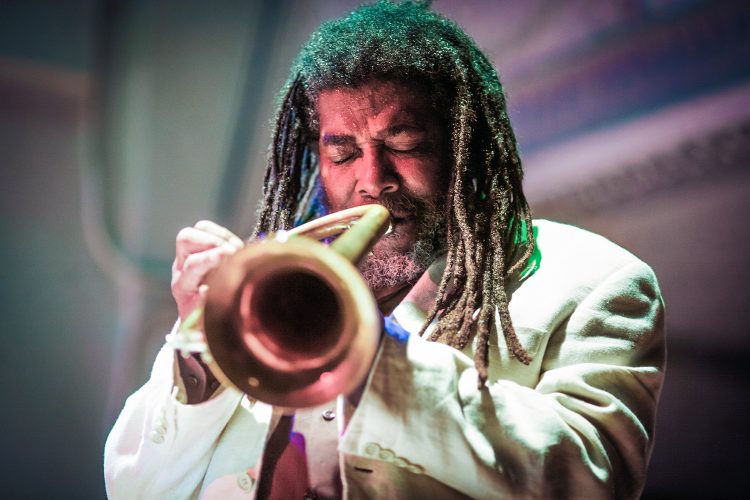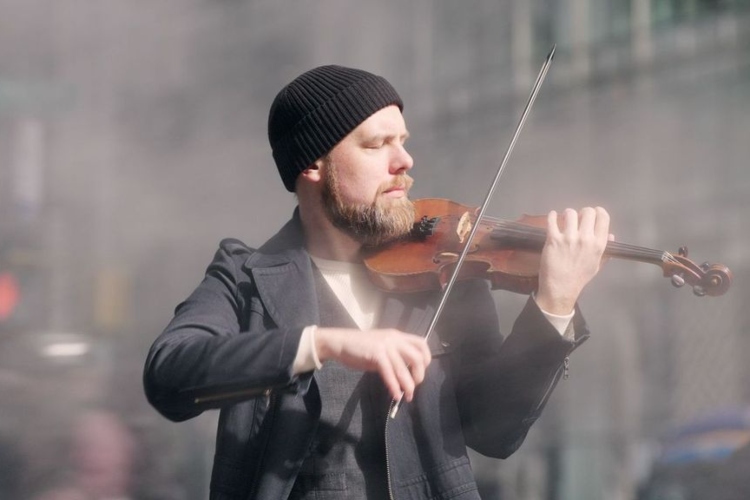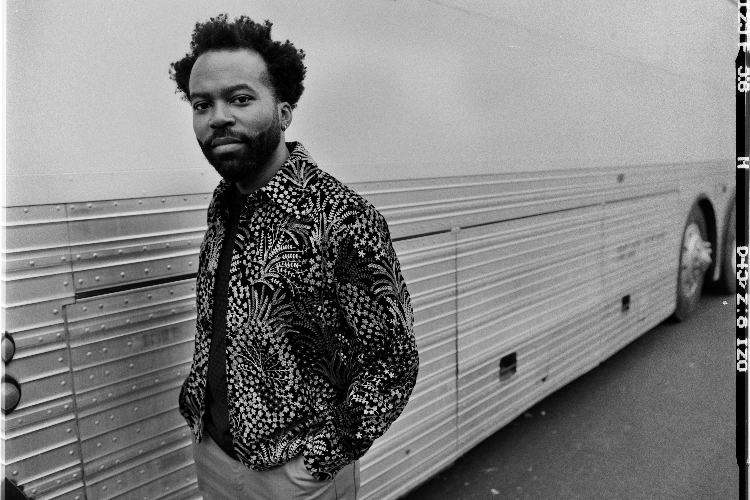Four Score: A Conversation with Wadada Leo Smith on Turning 80 (Part Two)
|
Getting your Trinity Audio player ready...
|
Our conversation with the legendary Wadada Leo Smith continues with a further discussion on the business side of music, including his own label, Kabell. We go into a deeper dive on his recent duet with Jack DeJohnette and Vijay Iyer, A Love Sonnet for Billie Holiday (TUM, 2021), and his latest solo release, Trumpet (TUM, 2021). We conclude by discussing the influences of the AACM, the music of different cultures, and the Blues.
The first part of our conversation can be found here.
PostGenre: As to the commercial side of music, you formed the Kabell label in the 1970s to release your music. Today it is commonplace for artists to have their own label, but that was not the case in the 1970s. Do you feel like you were ahead of the times in starting your own label?
Wadada Leo Smith: Well, I don’t know if you can be ahead of your time because you’re still in the same zone. Kabell Records still exists. I have major products that are waiting to come out and just haven’t yet because I have such a huge backlog of stuff that’s coming out over the next year and that come out over the last two years. I’m kind of waiting until the Fall of 2022 to bring out the stuff I have for Kabell. I have several projects that are waiting to come out on Kabell, including a duet I did with Don Cherry. All of the Kabell recordings will be put out on vinyl LP.
PG: Why vinyl only, instead of say CD or digital? Do you think vinyl provides a truer depiction of your sound?
WLS: It goes back to the commoditization of music. I’m not looking for a commodity and vinyl lets you issue recordings as limited editions, which helps avoid it being treated as a commodity.
PG: Going back to A Love Sonnet for Billie Holiday, the recording is the first time you, Jack DeJohnette, and Vijay Iyer performed together as a trio. But you have excellent duet recordings with each of them; America with DeJohnette (Tzadik, 2009) and A Cosmic Rhythm with Each Stroke (ECM, 2016) with Iyer. When you began working on Love Sonnet, did you think that album would be somewhere between those two albums in terms of its sound?
WLS: No. Love Sonnet is almost entirely designed especially for the three of us as a trio. Jack and Vijay each contributed one of their own compositions, I wrote two, and then “Rocket” was by all three of us. Because of the way we structured the album, it could only have been for the three of us providing a unique voice as a trio.
PG: Love Sonnet also makes use of electronics. You have also shown a willingness and interest in incorporating electronic instruments in your other music. Where do you see the role of electronics in the music-making process?
WLS: Electronic instruments just provide another quality. Music is never going to fundamentally change unless it can be made a different way. And the way we make music on this planet is the most perfect way that can be. The artist must put themselves into the music whether they breathe their breath into an instrument, put their blood through their fingers to control it, or put their blood in their feet to make sound. All of those things are indicative of the human being. The devices we use to make art are all touched by the individual. That’s how it will always be on this planet. Now, if we have a different environment like on Mars or some other place that has potential, we don’t know what may happen to make music. But here, it is all about the human touch.
PG: And, partly because of that close physical connection an artist has with their instrument, a solo performance can be particularly personal and intimate. You’ve done several solo recordings throughout your career thus far, from your first date as a leader [Creative Music – 1 (Kabell, 1972)] to Trumpet (TUM, 2021). Do you feel more artistic freedom when playing solo compared to working with others?
WLS: No, or at least that’s not the case for me. I see musical instrumentation as a form. A quartet form is an ensemble and a solo is a solo and a larger group is an orchestra. And none of them replace each other. With a solo performance you play alone, but when you dig down, you are doing the exact same thing inside of a performance that you would be in a larger group. And the most important thing, whether it is a performance by yourself or in a group with 100 billion people playing, all comes down to a single question: how well do you receive inspiration and how well can you articulate that inspiration into reality and detail?
PG: I imagine your experience with the AACM also partly plays into that perspective. How do you feel the AACM has changed the shape of modern music?
WLS: Well, the AACM as an organization philosophically had a big influence on music today. And then you look at the pathfinders out of AACM. You have all five members of the Art Ensemble of Chicago – Roscoe Mitchell, Famadou Don Moye, Lester Bowie, Malachai Favors, and Joseph Jarman. You have the Creative Construction Company with myself, Anthony Braxton, Leroy Jenkins, and Steve McCall. You have Henry Threadgill. All of those people who went out into the world and created their art are the ones who kept the AACM idea alive. Otherwise, it would have become very much a local prospect.
PG: In terms of musical ideas spreading geographically, you had studied musicology at Wesleyan University. How do you feel the sounds of other cultures have entered into your music and do you feel like the internet has changed how people approach other cultural music generally?
WLS: I think people do their own research and find what they are looking for in those places. I studied a little bit of ethnomusicology at Wesleyan but that was not my biggest reason for going there. My biggest reason was the instruments that were there. I studied the Koto while I was there. I studied the African Ghanaian flute. I studied the south Indian flute. I studied the gamelan. Those were the main reasons I went there. I didn’t go there to do the ethnomusicology approach. I only did that to provide a base for understanding the instruments and learn what they, and the ensembles they were used in, were about. And, to me, that’s the real important part. The notion of performance, practice, and how to look at something and break down the misconceived ideas about music from other places.
For example, often we tend to think that only Western music has structure and form but every music has that. We tend to think that only Western people can compose music books, but every performer is a composer. Music is important all over the planet, divorced from the politics and suppression that wealthy and powerful nations use.
PG: On the issue of the powerful suppressing certain people, you had started out playing the blues. Do you feel like that kind of music has shaped your approach to compositions?
WLS: The blues is the most important part of my music and my most significant influence. When people think about the blues, they think about 12 bars and the like. But blues has nothing to do with that. It is all about sound. The blues was the freest form of music in America before the advent of Ornette Coleman, Sun Ra, and other people like that. And if you don’t believe that, listen to John Lee Hooker or Charlie Patton. You will find out that their music is not bound by some notion of 12 bars.
PG: And related to early musical influences, you had originally wanted to play drums before you began on the trumpet?
WLS: Yeah, that was like a three and a half second inspiration.
PG: Do you feel like you approach rhythm differently than most trumpet players because of that interest?
WLS: I approach rhythm differently because I figured out what rhythm was. There are only two kinds of rhythm. There’s metrical rhythm, where everything is based on weak and strong beats. And there’s proportional rhythm, which has no weak and strong beats but instead is understood by visual sight as opposed to counting.
And once you figure that out, you can also conclude that the metrical system has two forms – even forms and odd forms. Even if it is a cycle like they do in western Asia where you have, say, 2 or 6 plus 9 plus 8 plus 6 plus 20… once you get to the end of it and add it all up if it is an even figure, all of those were even. If it is an odd figure, all of those were odd. That’s the nature of metrics. By contrast, with proportional rhythm, you are bound by the relationship between long and short sounds. When you figure that out, you can see a larger field in which rhythm is important.
PG: Is there anything you would like to explore musically that you have not yet done?
WLS: I haven’t done everything and, as I said at the beginning of our conversation, I rely upon dreaming, contemplation, and meditation. Those things keep me ahead of myself. They push me forward constantly, away from what I have already done. I just state it in this way because I’m not in competition with negative forces or other people out there. I’m a loner. I define myself as an organic loner and I just look to move forward with that kind of understanding.
Wadada’s 80th Birthday Celebration will take place on December 18, 2021, and be available on his website and on Youtube. It will feature Smith in a duet with Erika Dohi on piano/electronics and an ensemble with Smith joined by Pheeroan AkLaff on drums, Erika Dohi on piano, and Lamar Smith guitar.
The following albums are now available from TUM Records’ website: solo trumpet set, Trumpet; a series of duets and trio with Bill Laswell and the late Milford Graves, Sacred Ceremonies; trio with Jack DeJohnette and Vijay Iyer, A Love Sonnet for Billie Holiday; and multi-disc recording of Smith’s Great Lakes Quartet featuring Henry Threadgill, DeJohnette, and John Lindberg, The Chicago Symphonies.
Sunbeams of Shimmering Light, a trio with Mike Reed and Douglas R. Ewart, can be purchased from Astral Spirits’ Bandcamp page.




3 thoughts on “Four Score: A Conversation with Wadada Leo Smith on Turning 80 (Part Two)”